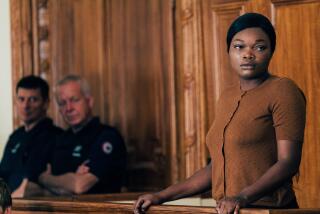KONCHALOVSKY FILMS IN SOVIET SERIES
- Share via
Two films--worlds and centuries apart--from director Andrei Konchalovsky pose the same question: Can love bring happiness?
One is “Maria’s Lovers,” his first American film, set just after V-J Day in a bleak blue-collar town in Pennsylvania; the other his superb 1970 film adapted from Turgenev, “Nest of Gentry,” unfolding amid a world of crumbling aristocratic grandeur, as sumptuous and romantic as anything from Ophuls or Visconti.
Both are at the Fox International Friday and Saturday only as part of its ongoing Soviet cinema series. Program information: (213) 396-4215.
Humor scarcely gets earthier than it is in “The Clinic” (at the Vista through Saturday). Set in a Sydney VD clinic, it offers a refreshingly liberated view of sex in all its orientations, but writer Greg Millin rarely rises above the level of sitcom in his characterizations and gags and, as a result, “Clinic” never seems as hilarious and outrageous as it ought to be.
In its New Quebec Cinema series, UCLA would have been better off screening the irresistible “Les Plouffes” (“The Plouffe Family”), shown at Filmex ’82 but never released in theaters and skipping its hopelessly contrived 1984 sequel “Le Crime d’Ovide Plouffe” (8 p.m. Thursday at the Melnitz).
Drawn from Roger Lemelin’s novels, the earlier film, set in the late ‘30s, was a long, folksy saga of a French-Canadian family up through World War II. Its inherent sentimentality was undercut by the oppressive roles of English-speaking Canada and the Catholic Church in the lives of these Quebecois. This new film involves the oldest Plouffe son (Gabriel Arcand) in an extravagant soap-opera plot that finds him falsely accused of a crime of passion.
It’s a busy week at UCLA. Les Blank, the premier documentarian of folk ways and the food, music and the good times that go with them, receives a retrospective of his fine films, starting tonight at 7:30 in Melnitz with “The Blues According to Lightnin’ Hopkins” (1968); “Werner Herzog Eats His Shoe” (1980), and his masterpiece, “Burden of Dreams” (1982), his record of Herzog’s obsessive filming of “Fitzcarraldo.” It is a work which, as time passes, looms as more complex and compelling than “Fitzcarraldo” itself.
Tuesday: “Sprout Wings and Fly” (1984); “Always for Pleasure” (1978), and “Garlic Is as Good as 10 Mothers” (1980). Friday: “Chulas Fronteras” (1976) and “In Heaven There Is No Beer?” (1983). Blank will be present for the Friday screening, and will conduct a workshop Saturday at 2 p.m. in Melnitz 2534.
Saturday marks the beginning at Melnitz of three weekends of “The Films of Xie Jin,” who’s widely regarded as China’s leading director. The series begins (at 7:30 p.m.) with his best-known films, “The Red Detachment of Women” (1960), tracing the transformation of a vengeful slave girl into a revolutionary fighter, circa 1930, and “Two Stage Sisters” (1964), an engaging backstage melodrama, set in 1935, about two opera singers, one a revolutionary. There are many poignant moments as their itinerant troupe tours the countryside before arriving in the treacherous, decadent Shanghai of the late ‘30s. For further information on all Melnitz movies: (213) 825-2345.
Lucy Winer’s “Silent Pioneers,” Wednesday only at the Nuart, was praised by Len Klady in his Filmex review in The Times as “a remarkable document on senior members of the American gay community.” He found that it “truly taps into the very personal nature of a less tolerant era.” Sharing the bill is Debra Chasnoff’s and Kim Klausner’s “Choosing Children,” a documentary on the challenges to lesbians as parents.
More to Read
Only good movies
Get the Indie Focus newsletter, Mark Olsen's weekly guide to the world of cinema.
You may occasionally receive promotional content from the Los Angeles Times.








